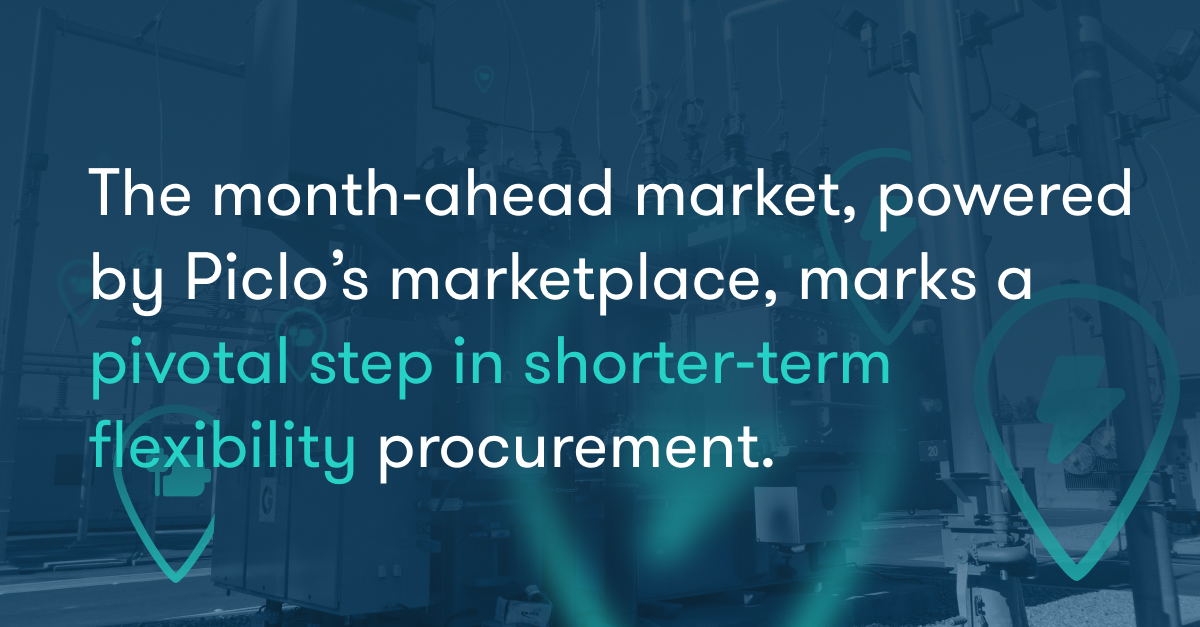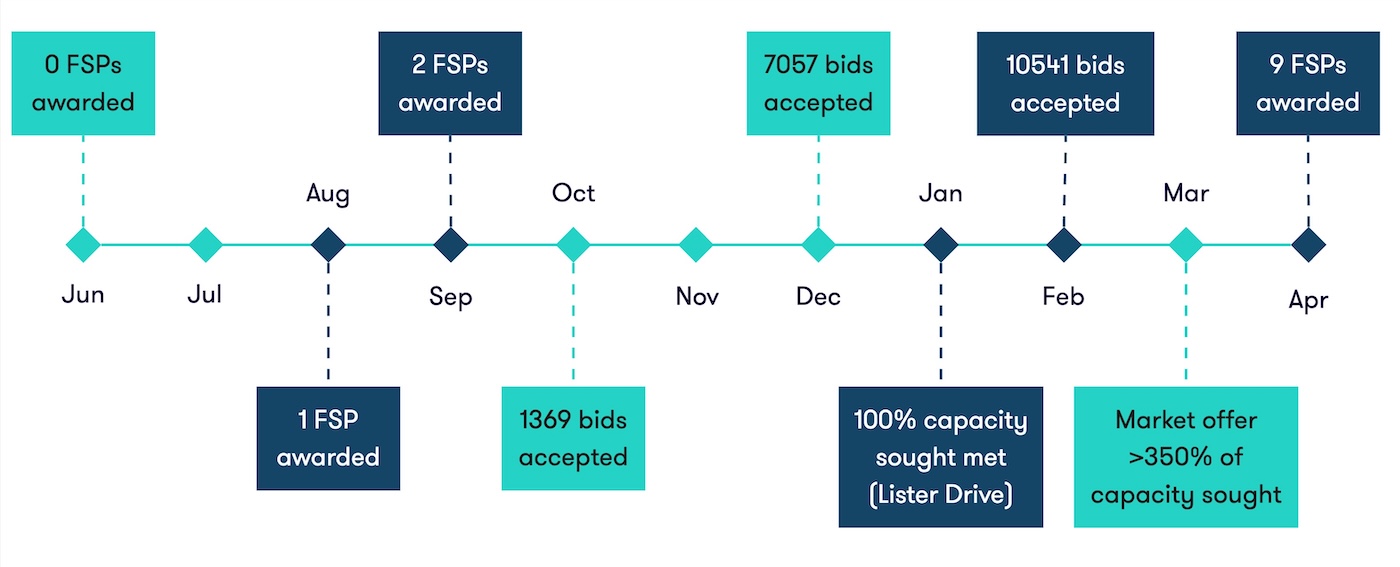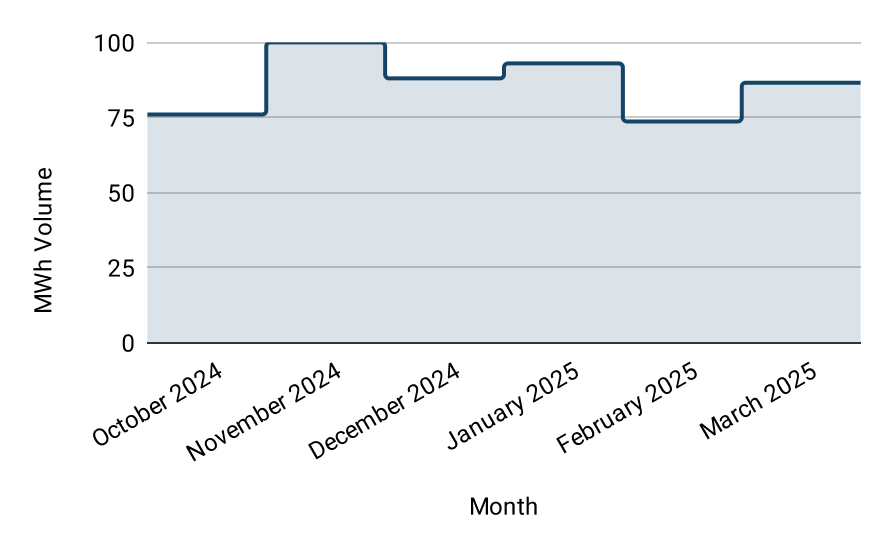SP Energy Network’s Month-ahead Market: A success story for shorter-term flex in Great Britain


SP Energy Networks' (SPEN) month-ahead flexibility market, powered by Piclo, awarded £170k across 590 MWhs, proving shorter‑term flex procurement can balance the grid and boost participation.
What is flexibility?
Flexibility is the ability to adjust electricity consumption or generation to help balance the grid during periods of constraint by turning off or reducing the demand of home devices or grid-connected resources at specified times. Rather than relying on costly traditional reinforcements, system operators can leverage local resources such as EV chargers to address localised pressure points.
What is shorter‑term procurement?
As renewable energy generation and the adoption of low-carbon technologies grow, managing the electricity grid has become more complex, necessitating smarter technologies to balance demand and supply. Shorter-term procurement enables system operators to procure flexibility rapidly based on network forecasting. In this case, flexibility can be procured a month before forecasted need.
Flex Service Providers (FSPs) benefit from more frequent opportunities with greater clarity on revenue, without the need for long-term contracts, which attracts a wider variety of participants and technologies. Consequently, consumers benefit from lower energy bills, lower carbon emissions, and a more robust grid equipped to handle future requirements.
The month-ahead timeline at a glance
In June 2024, with Piclo’s support, SPEN introduced its inaugural month-ahead flexibility competition. This initiative marked a shift towards an enduring solution to meet their evolving flexibility needs, and a major change from procuring only long-term flexibility (reserving flexibility several years ahead of need), which SPEN had done since 2019. By April 2025, SPEN had significantly expanded its efforts, listing over 100 competitions across both high and low voltage locations. These competitions were for the Scheduled Utilisation product. Scheduled Utilisation is the most firm flexibility product, requiring Flexibility Service Providers (FSPs) to deliver a predetermined volume of flexibility at predefined, pre-scheduled times.

Common Challenges
Finding the right asset in the right location at the right time is a common challenge when it comes to flexibility. Often, potential flexibility providers and their assets are not situated in the areas where system operators require support. Additionally, meeting 100% of the capacity sought can be difficult, especially when the volume of available resources is low or fragmented.
Piclo developed a network topology tool that significantly enhanced SPEN's ability to evaluate its embedded capacity, streamlining the asset validation process. The network topology tool uses meter identification (MPAN) data provided by the System Operator to ensure that assets connected to the network can auto-qualify. This innovation enabled automatic processing and onboarding of assets, allowing both Piclo and SPEN to more effectively identify opportunities.
The network topology tool helped to drive engagement efforts and improve turnaround times, representing a considerable improvement over previous procurement rounds.
Market participation was initially slow following the month-ahead launch, but by consistently engaging with flex providers and leveraging quality datasets, participation has increased incrementally and continues to do so.
Moreover, SP Energy Networks enhanced its open data portal to facilitate easier access to open network data, particularly flexibility datasets sourced from the Piclo marketplace, such as historical bids. This initiative aims to enable FSPs and stakeholders to make more informed business decisions while broadening market data access.
A Milestone for Month-Ahead Flexibility
Despite these common challenges, a significant milestone has been met: 100% of the flexibility requirements were met across multiple competitions.
Lister Drive
This competition saw consistent success across four month-ahead competitions between October 2024 and January 2025, where 100% of the capacity was met consecutively.
- MWhs: 75 MWhs awarded in total.
- Value: Over £20,000 worth of value awarded.
- Bidders: AMP Clean Energy met 100% of the requirements each time.
Warrington
The requirements for Warrington were listed for a single month in March 2025, and the market response was notable. The volume offered by market participants exceeded 350% of the volume originally sought by SPEN:
- MWhs: 84 MWhs awarded in total.
- Value: Over £8,000 worth of value awarded.
- Bidders: AMP Clean Energy, Axle Energy, and EV.Energy met 100% of the requirements.
Summary: Month-Ahead Success by Numbers (to Jul 2025)
- £170,000 worth of flexibility contracts awarded.
- Over 590 MWhs of flexibility awarded.
- 25 FSPs onboarded and 10 FSPs awarded flexibility contracts.
- Over 11,000 bids accepted, across 99 competitions, resulting in a record-breaking increase in comparison to long-term tenders held in previous years.
- Participation from a mix of technologies: Gas peakers, EV chargers and Domestic DSR.
- Bidder success rate of 84%, which led to a high probability of success for new participants.
- 76% of the month-ahead competitions received accepted bids.
Numbers are correct as of July 2025

These numbers underline just how active and competitive shorter-term procurement can be. Tens of thousands of bids were reviewed and awarded, enabling SPEN to address its needs and deliver the most cost-effective outcome for all involved.
“At Axle, we're proud to offer our clients 100% coverage of the UK's DSO flexibility markets, and Piclo has been a critical enabler here. For SPEN's month-ahead market specifically, we've benefited from Piclo's consistently straightforward approach to asset qualification, bidding, and settlement. This allows us to focus our time on what matters most: optimising EV chargers, batteries, and heat pumps.”
Pelle Jacobs @ Axle Energy
Looking to the future
In summer 2025 Piclo and SPEN recently enhanced the competition creation process. Previously, competitions were configured manually, but following integration with Piclo’s APIs, SPEN now benefits from seamless automatic listings publishing their requirements at scheduled times.
Optimised integrations are supporting the transition to shorter-term markets and operational products. In addition to month-ahead procurement, SPEN is working towards nearer real-time options, such as a day-ahead market, to meet its growing needs.
Conclusion
1. Shorter-term Procurement Drives Participation
Shorter-term procurement models, like month-ahead, demonstrate a clear path toward increased participation and market activity. This model is crucial for adapting to the dynamic demands of modern energy grids and accelerating Great Britain’s net-zero ambitions.
2. A Diverse Asset Mix
By integrating a mix of distributed energy resources, from low-carbon technologies to traditional gas generators, SPEN successfully leveraged a diverse set of resources. This demonstrates a vibrant market where everyone thrives, ultimately enhancing the grid's resilience and adaptability in the short and long term.
3. Open Data is Essential
FSPs require transparent and open access to market data, particularly flexibility datasets, as this empowers them to make informed business decisions, mobilise resources and effectively participate in energy markets.

